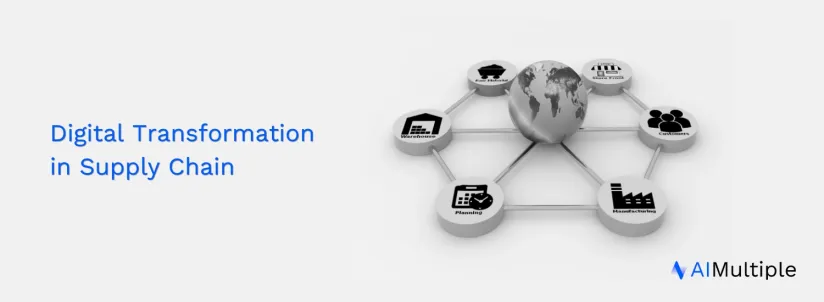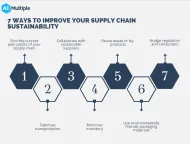Top 3 Digital Transformation Supply Chain Best Practices in 2024


A study commissioned by GEP reports that even though 90% of executives acknowledge the importance of supply chain optimization through digital means, only 8% have truly achieved digital maturity in their supply chains. As companies strengthen their supply chains using the lessons learned from the Covid-19 pandemic, they need to leverage digital solutions to pave the way.
This article explores how companies can leverage digital technologies for their supply chain and logistics operations to achieve higher efficiency, resiliency, and sustainability.
1. Increase efficiency in the supply chain and logistics operations
Leverage Automation
Automation can be implemented in various parts of the supply chain to reduce repetitive and error-prone tasks so that the employees can focus on higher-level tasks.
Robotic process automation (RPA) enabled with artificial intelligence (AI) can be integrated with shipping management software and relieve logistics managers from repetitive tasks, which can cause inefficiencies.
For example:
- RPA can help automate shipping schedule monitoring and provide regular updates to all relevant parties with automated email communication.
- RPA can also be integrated with freight billing systems to automate invoice processing, credit collection, and follow-up on payment completion from hundreds of third-party logistics companies.
Automation can help increase efficiency across the supply chain. For example, An automated transportation management system (TMS) can help companies reduce logistics costs by optimizing vehicle routes and shipment scheduling.
DHL is also collaborating with other companies to innovatively leverage automation in its operations.
To learn more about how automation can strengthen your supply chain, check out our comprehensive article on supply chain automation.
Improve procurement processes
Implementing cloud-based procurement systems in your business can provide real-time costs tracking that can help in avoiding budget exceeds and improve overall cost efficiency.
Online procurement software can make the purchasing process more accurate and transparent. For example, cloud-based order processing can efficiently perform tasks such as order management, order fulfillment, and billing.
Companies can also improve supplier management through this technology by making better decisions on which supplier to invest in.
Watch how Magellan Midstream Partners fully digitized its energy procurement process to achieve higher efficiency.
Reduce data management costs
According to a recent study by DiCentral and Lehigh University, manual data entry in ERP systems can waste around $1 million on average. This is due to human errors, which can cause misalignment in data entries. Using digital data collection and management software can help reduce errors, resulting in higher efficiency.
Digitalization can help reduce costs in many ways; however, supply chain managers need to take a more holistic approach to achieve costs reductions and success.
Here are five ways to reduce supply chain and logistics costs:
2. Improve resilience across the supply chain
The recent pandemic acted as a test for supply chains and identified many weaknesses. Companies faced rapid fluctuation in demand and supply that resulted in many supply chains to collapse. Hence, supply chain managers need to strive for more flexibility and resilience.
Digital transformation can enable supply chain managers to increase resiliency in the supply chain to handle uncertain situations such as the pandemic.
Improve demand forecasting
Having a more accurate picture of the demand can significantly reduce uncertainty across the supply chain. Supply chain managers can leverage predictive analytics powered by ML, AI, and IoT to help predict more accurate forecasts.
Here are some real-world examples:
Luxottica, one of the world’s largest eyewear companies, uses ML in its demand forecasting. Through the smart forecasting engine, the company managed to increase its accuracy by 10%.
Costa coffee uses IoT devices in its coffee machines that send real-time sales data to the company to improve demand planning.
Samsung leverages AI to improve its demand forecasting accuracy
Improve visibility and tracking
Introducing systems within your supply chain that provide real-time shipment information can help business partners manage potential risks and problems. For instance, RFID (Radio-frequency identification) technology can be used to trace shipments to enhance end-to-end supply chain visibility accurately.
Identify root causes
Process mining in logistics can help optimize logistics operations by identifying the root cause of delays and improving resilience in the supply chain.
Watch how Nestle leveraged process mining to optimize its logistics operations
Collaborate and share data
Cloud computing provides uninterrupted access to data that supply chain managers depend on for making critical business decisions. Through cloud computing, all business partners in a supply chain can work collaboratively by sharing important data.
3. Enhance sustainability in supply chain and logistics
As shown in figure 1, The investment in digital technology to improve the economic and environmental sustainability of supply chains is forecasted to increase to $75 billion by 2030, which is more than double from 2019.
Figure 1. Investment in digital technology for sustainable supply chain and logistics 2019 to 2030
Digital technology is the way towards more sustainable supply chain and logistics operations.
Reduce freight transport emissions
Vehicle routing software based on AI can also enable a significant reduction in logistics emissions. This software uses sophisticated algorithms with environmental parameters to provide optimal vehicle routes to improve your transport network.
DHL uses its transport network optimizing system to significantly reduce greenhouse gas (GHG) emissions
Improve your fleet’s driving behavior
Modern telematics tools can help reduce the carbon footprint of a logistics fleet. This can be done by gathering and analyzing the data from drivers and using it to reduce vehicle idling. As a result, companies can significantly reduce their logistics carbon footprint.
However, to facilitate this solution, logistics fleet managers must also provide proper training to their drivers on how to drive safely, efficiently, and sustainably.
Use Blockchain for more transparency
The idea is to use blockchain technology to store information accessible to all business partners within the supply chain. Blockchain technology has implications in sustainable supply chain management’s social and environmental aspects. For example, since supply chains become truly transparent through a blockchain system, the company can ensure ethical practices and better track carbon emissions disclosure from suppliers. Since this technology is relatively new, managers are advised to study and understand its implications in their own business before investing in it.
Samsung provides solutions for enhanced business transparency based on blockchain
Improve carbon footprint management
To efficiently calculate and reduce your carbon footprint, check out our comprehensive articles:
- 4 Steps to Calculate the Carbon Footprint of Your Organization
- 5 Ways to Reduce Corporate Carbon Footprint.
Further reading:
To accelerate your digital transformation process, check out:
- Digital Transformation Frameworks from Top Consulting Firms
- Top 7 Digital Transformation Best Practices for the Organizations
- Digital Transformation in different sectors
You can also check our sortable/filterable list of digital transformation consulting companies to find the fit that best suits your business needs.
If you have questions about digital transformation in supply chain and logistics, let us know:



Comments
Your email address will not be published. All fields are required.